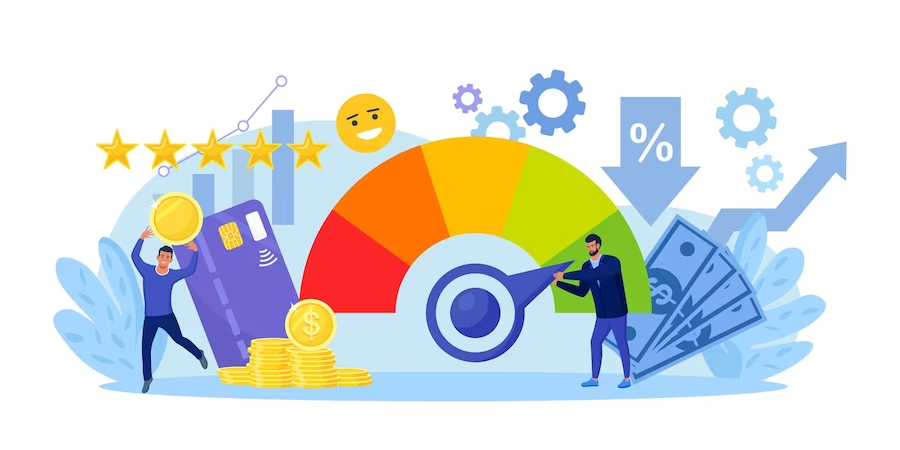Credit Tip Tuesday #129-What Are The Factors That Impact Your Credit Score?

Image Credits: Freepik
Have you ever wondered what goes into determining your credit score?
It is like a magical number that has the power to influence your financial life in more ways than you can imagine. If you are applying for a loan, renting an apartment, or even getting a shiny new credit card, your credit score is the gatekeeper that determines your fate.
But what factors actually impact this all-important number— Credit Score?
Well! In this blog post, we are going to dive into the factors that can make or break your credit score.
1. Payment History

Image Credits: Freepik
Your payment history is like the backbone of your credit score. It is the most critical factor that impacts your creditworthiness.
Lenders want to see that you consistently pay your bills on time and fulfill your financial obligations. Late payments, defaults, and collections can significantly negatively impact your credit score.
Paying your bills on time is a responsible financial habit and crucial for maintaining a healthy credit profile. Late payments can stay on your credit report for up to seven years, dragging down your score and making it more challenging to secure loans or credit cards in the future.
To ensure you have a strong payment history, it is essential to stay organized and diligent. Set up automatic payments or reminders to help you stay on track with your bills. Prioritize your financial obligations and make timely payments consistently. Doing so demonstrates to lenders that you are a reliable borrower who can be trusted to manage credit responsibly.
Building a solid payment history takes time, but it is worth the effort. It forms the foundation of your credit score and opens doors to better financial opportunities.
2. Credit Utilization Ratio

Image Credits: Freepik
Your credit utilization ratio is a crucial factor that impacts your credit score. It refers to the amount of credit you use compared to your available credit limit. Keeping your credit utilization low is essential for maintaining a healthy credit score.
Here are a few reasons:
● The 30% Rule
Financial experts recommend using no more than 30% of your available credit. For example, if your credit limit is $10,000, aim to keep your balance below $3,000. High credit utilization suggests that you heavily rely on credit and may be at risk of overextending yourself financially.
● Lender Perception
A high credit utilization ratio can indicate a higher risk to lenders. It may imply that you depend on credit and potentially struggle to manage your finances. Lenders may hesitate to offer you additional credit or loans if they perceive you as a higher-risk borrower.
● Impact On Credit Score
Your credit utilization ratio heavily influences your credit score. A lower ratio demonstrates responsible credit usage and can positively impact your score. On the other hand, a high ratio can lead to a lower credit score, making it harder for you to access credit in the future.
To maintain a healthy credit utilization ratio, keeping your balances low compared to your credit limits is essential. Avoid maxing out your credit cards or carrying high balances from month to month. Instead, strive to pay off your balances in full or at least make more than the minimum payment.
Regularly monitoring and paying your credit card balances on time can help you keep your credit utilization ratio in check. If possible, consider requesting a higher credit limit to increase your available credit, which can lower your utilization ratio.
By keeping your credit utilization ratio low, you show lenders that you can effectively manage credit, which can positively impact your credit score and improve your chances of obtaining favorable terms for loans and credit in the future.
3. Credit History Length

Image Credits: Freepik
The length of your credit history is an essential factor influencing your credit score. Lenders want to see a track record of your financial behavior over time. The longer you have bad credit, the more information lenders have to assess your creditworthiness.
If you are just starting to build your credit history, patience is essential. While it may take time to establish a solid credit history, it is never too late to begin. Start by opening a credit card or obtaining a small loan and use it responsibly. Make timely payments and keep your balances low.
As time passes, your credit history will grow, and lenders will have more data to evaluate your creditworthiness. In the end, building a solid credit history takes time and responsible financial behavior. Avoid closing old credit accounts, as they contribute to the length of your credit history.
4. Credit Mix

Image Credits: iStock
Having a diverse credit mix is an essential factor that can impact your credit score. Lenders like to see that you can handle different types of credit responsibly.
This is why the credit mix matters:
● Variety Of Credit
Having a mix of credit types, such as credit cards, loans (auto loans or student loans), and even a mortgage, demonstrates your ability to manage different financial obligations simultaneously.
● Responsible Management
Successfully handling different types of credit shows lenders that you can balance multiple accounts, make timely payments, and effectively manage your financial responsibilities.
● Risk Assessment
A diverse credit mix provides a more comprehensive view of your creditworthiness. It helps lenders assess your risk level, as different types of credit carry varying levels of risk.
● Building A Strong Profile
Diversifying your credit mix can build a stronger credit profile over time. This can increase your chances of obtaining favorable terms for loans and credit.
Remember, while credit mix is essential, it is crucial not to take on credit solely for diversity. Only apply for credit when needed and ensure that you can handle the responsibility of managing multiple credit accounts.
5. New Credit Applications

Image Credits: Freepik
Regarding your credit score, applying for new credit wisely is crucial. Whenever you apply for credit, such as a new credit card or loan, it triggers a hard inquiry on your credit report. Multiple hard inquiries within a short period can raise concerns for lenders and potentially lower your credit score.
To protect your credit score:
- Be selective about the credit you apply for.
- Avoid unnecessary applications and only pursue credit that you genuinely need.
- Before applying, take the time to research and compare different options to find the best fit for your financial situation.
It is worth noting that checking your own credit score or receiving pre-approved credit offers results in soft inquiries, which do not impact your credit score. So feel free to monitor your credit without worry.
Remember, applying for new credit should be a deliberate decision. Each application should align with your financial goals and be approached with caution. By applying wisely, you can avoid unnecessary credit inquiries and maintain a healthy credit score that reflects your responsible borrowing habits.
6. Public Records And Collections

Image Credits: iStock
Public records and collections can significantly negatively impact your credit score. It is crucial to avoid these issues as much as possible. The reasons for this are as follows:
● Bankruptcies
Filing for bankruptcy can severely damage your credit score and stay on your credit report for several years. It indicates to lenders that you were unable to fulfill your financial obligations.
● Tax Liens
Unpaid taxes can result in a tax lien, which is a claim against your property. Tax liens can harm your credit score, making it harder to access credit or obtain favorable terms.
● Collections
When debts are sent to collections, it implies that you have failed to repay what you owe. Collections can significantly lower your credit score and make it challenging to secure credit in the future.
It is crucial to avoid public records and collections as much as possible. These negative marks can stay on your credit report for several years, dragging down your credit score and making it challenging to secure loans or credit in the future.
To avoid public records, it is essential to manage your finances responsibly. Pay your debts on time, communicate with creditors if you are facing difficulties, and seek professional advice if needed. Negotiating payment plans or settlements to prevent collections and protect your credit score is better.
If you find yourself dealing with collections, take immediate action to resolve the issue. Pay off the debt or arrange a payment plan with the collection agency. Once the debt is settled, monitoring your credit report to ensure that the collection status is updated accordingly is crucial.
7. Regularly Monitoring Your Credit Report

Image Credits: Freepik
Monitoring your credit report is essential for maintaining a healthy credit score. Your credit report provides a comprehensive overview of your credit history and is a valuable tool for assessing your financial standing.
By regularly reviewing your credit report, you can:
● Identify Errors
Mistakes happen, and errors on your credit report can negatively impact your credit score. By reviewing your report, you can identify any inaccuracies, such as incorrect account information or unauthorized accounts, and take the necessary steps to rectify them.
● Detect Fraudulent Activity
Monitoring your credit report allows you to detect signs of identity theft or fraudulent activity. If you notice unfamiliar accounts or suspicious inquiries, you can take immediate action to protect yourself and mitigate any potential damage.
● Track Your Progress
Your credit report reflects your financial behavior and progress over time. By regularly checking your report, you can gauge how your credit score is improving and identify areas where you can make further adjustments to enhance your financial health.
In Canada, you are entitled to a free copy of your credit report from credit bureaus like Equifax and TransUnion. Take advantage of this opportunity and review your report at least once a year, if not more frequently. By staying proactive and informed, you can actively manage your credit and work towards achieving your financial goals.
The Bottom Line
The bottom line is that your credit score is influenced by several key factors, and some of those we have discussed in this blog. Now that you are armed with this knowledge, you can take proactive steps to maintain a healthy credit score.
Then, why don't we put these factors to good use?
Take control of your credit, make smart financial decisions, and watch your score soar. Your future self will thank you when you can secure better loan terms, snag that dream apartment, or get approved for that awesome credit card.
It is time to take charge of your credit destiny, my friend. Build a solid foundation for financial success, one credit score point at a time!


